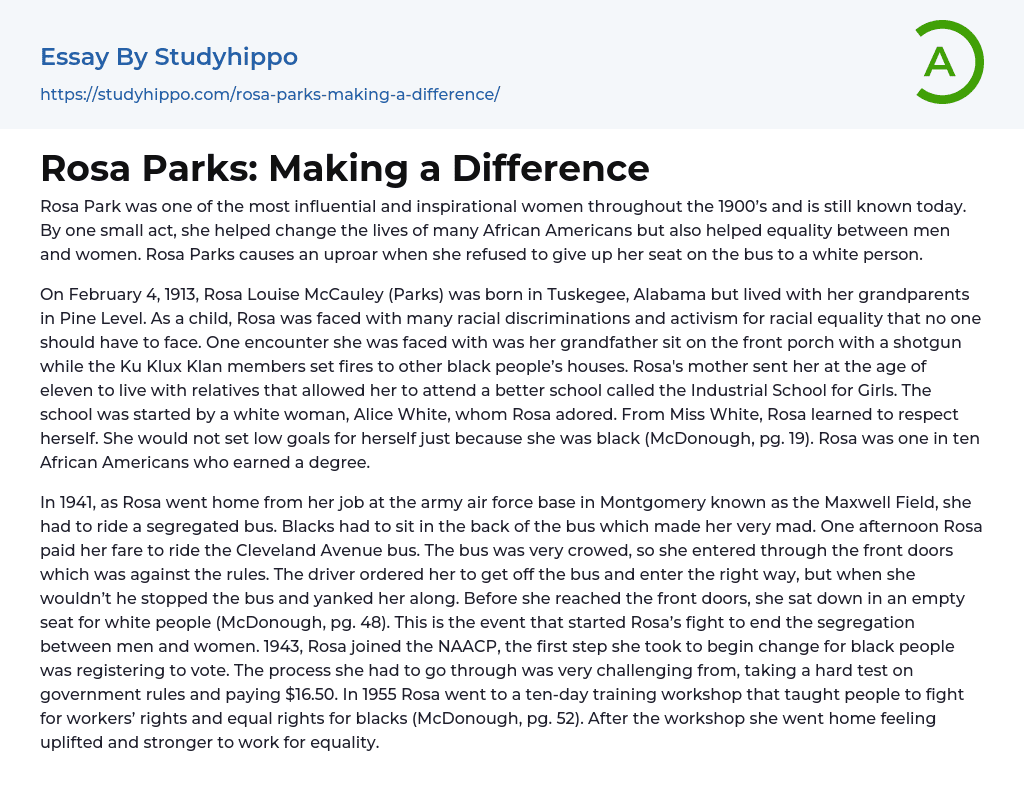Rosa Park, a highly influential and inspirational woman, made significant contributions in the 1900s and continues to be recognized today. Through a single act, she not only brought about positive change for African Americans but also contributed to gender equality. Rosa Parks created controversy by defying societal norms and refusing to surrender her bus seat to a white individual.
Rosa Louise McCauley (Parks) was born in Tuskegee, Alabama on February 4, 1913. However, she grew up with her grandparents in Pine Level. During her childhood, Rosa experienced numerous instances of racial discrimination and witnessed the fight for racial equality, which no one should have to endure. One incident that deeply affected her was when she saw her grandfather sitting on the front porch with a shotgun while the Ku Klux Klan members set fire t
...o the homes of other black individuals.
When she turned eleven years old, Rosa's mother decided to send her to live with relatives who offered a chance for her to attend a superior school called the Industrial School for Girls.
The school was established by Alice White, a Caucasian woman who greatly impacted Rosa. Miss White instilled in Rosa a strong sense of self-esteem and resolve. Rosa firmly held the belief that her racial heritage should not hinder her dreams or goals (McDonough, pg. 19). Among African Americans, Rosa belonged to the minority who achieved a college degree.
In 1941, Rosa, while leaving her job at the army air force base in Montgomery, known as the Maxwell Field, had to take a segregated bus home. This angered her because blacks were required to sit in the back of the bus. One day, Rosa boarded th
Cleveland Avenue bus by paying her fare and entering through the front doors, which was against the regulations. The bus was overcrowded at that time.
The driver instructed the woman to exit the bus and enter through the correct door, but when she refused, he halted the bus and forcefully dragged her. Just before reaching the front doors, she sat in an unoccupied seat designated for white individuals (McDonough, pg. 48). This incident marked the beginning of Rosa's activism to eliminate gender-based segregation. In 1943, Rosa became a member of the NAACP, and registering to vote became her initial action towards effecting change for the black community.
The process Rosa had to undergo was extremely challenging, encompassing a difficult government rules test and a payment of $16.50. In 1955, she attended a ten-day training workshop that aimed to empower individuals in fighting for workers' rights and equality for African Americans (McDonough, pg. 52). Following the completion of the workshop, Rosa returned home feeling inspired and empowered to continue advocating for equality.
- Ben jonson essays
- Billy elliot essays
- Dred Scott essays
- Frederick Douglass essays
- Geert Hofstede essays
- George Eliot essays
- Ginevra King essays
- Harriet Tubman essays
- John Keats essays
- John Proctor essays
- Joseph Stalin essays
- Mahatma Gandhi essays
- Napoleon essays
- Robert E Lee essays
- Rosa Parks essays
- Siegfried Sassoon essays
- Wilkie collins essays




